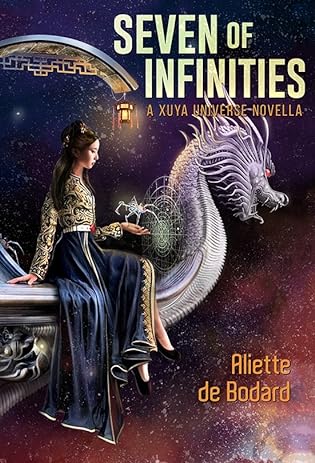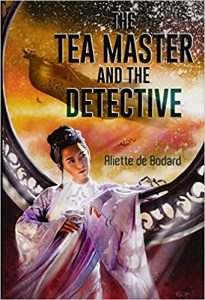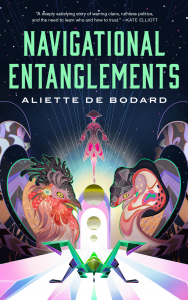 Seven of Infinities by Aliette de Bodard
Seven of Infinities by Aliette de Bodard Format: eARC
Source: supplied by publisher via NetGalley
Formats available: hardcover, ebook, audiobook
Genres: science fiction, science fiction mystery
Series: Universe of Xuya
Pages: 176
Published by Subterranean Press on October 31, 2020
Purchasing Info: Author's Website, Publisher's Website, Amazon, Barnes & Noble, Kobo, Bookshop.org, Better World Books
Goodreads
Vân is a scholar from a poor background, eking out a living in the orbitals of the Scattered Pearls Belt as a tutor to a rich family, while hiding the illegal artificial mem-implant she manufactured as a student.
Sunless Woods is a mindship—and not just any mindship, but a notorious thief and a master of disguise. She’s come to the Belt to retire, but is drawn to Vân’s resolute integrity.
When a mysterious corpse is found in the quarters of Vân’s student, Vân and Sunless Woods find themselves following a trail of greed and murder that will lead them from teahouses and ascetic havens to the wreck of a mindship--and to the devastating secrets they’ve kept from each other.
My Review:
This entry in the Universe of Xuya begins as a murder and a whole bunch of mysteries – not all of which are wrapped around the murder. Although, more are than first appears – which is true for the whole marvelous thing. There’s way more under every single surface than the characters initially believe. Still, it all begins when Student Uyên admits a forceful woman into her rooms, goes to make tea because she’s been taught to be a good hostess, and returns to find that her unidentified guest is dead on the floor.
Uyên may be on the cusp of adulthood, but she definitely needs a MUCH adultier adult to help her figure out this mess, so she calls for her teacher, Vân. Who, fortunately for them both, is in the midst of a discussion with her friend and fellow scholar, the mindship Sunless Woods. And an extremely fortunate happenstance for Vân, Uyên, and very much to her own surprise, Sunless Woods.
Van has secrets she can’t afford to have revealed. Sunless Woods has grown tireder and more BORED than she imagined keeping her own. While Uyên is in danger of being caught in the midst of a militia investigation designed to provide a guilty party for trial whether or not the party is guilty or not. Which Uyên, at the very least, most definitely is not.
Not that THAT little fact has ever stopped such an interrogation. After all, under enough torture, even the innocent will, sooner or later, confess to something, as Vân knows all too well.
Except that Vân really was guilty of the crime her best friends were executed for. It just wasn’t murder. And they weren’t innocent either. Then again, they also weren’t executed – at least not until the levers of justice finally ground one of them under and deposited the body in her student’s rooms.
 Not that Vân knows that, yet. Not that much of what Vân thinks she knows is remotely still true. Not the identity of that first corpse, not the reason her former friends have come hunting, and not an inkling of the true nature of the prize that they seek.
Not that Vân knows that, yet. Not that much of what Vân thinks she knows is remotely still true. Not the identity of that first corpse, not the reason her former friends have come hunting, and not an inkling of the true nature of the prize that they seek.
All Vân is certain of is that she and her student are in deep, deep, trouble, so she reluctantly reaches out to her only real friend, the mind ship Sunless Woods. Only to discover that she had even less idea about the secrets that her friend was keeping than even the mind ship had fathomed about her own.
Escape Rating A-: I had heard of the author’s vast, sprawling Universe of Xuya and was always intrigued by its loosely connected galaxy of short stories and novellas, but didn’t get the round tuit to actually pick it up somewhere in its vastness until The Tea Master and the Detective was nominated for the Hugo and the Nebula a few years ago and won the Nebula. That particular entry in the series was a great hook for this reader, as it is a science fiction mystery, a reimagining of Holmes and Watson as mind ships(!) and just a cracking good story all the way around.
So I kept my eye out for more entries in the series that were long enough to warrant separate publication, and therefore had a chance of eARCs. Which is rarer than one might think as most entries in this series are short stories that have been published in pretty much every SFF short fiction publication extant. They’ve not been collected, at least not yet, although I hope that happens.
Which led me, admittedly in a bit of a roundabout way, to Seven of Infinites, which I only remembered to unearth from the virtually towering TBR pile because the eARC of a new book in the Universe of Xuya popped up on NetGalley and I remembered I had this.
It turned out to be the right book at the right time, which is always lovely.
The Universe of Xuya, with its alternate Earth history deep in its background and its sentient population of both humans and mind ships – and possibly other species I haven’t’ met yet, puts together three things I wouldn’t have expected in the same ‘verse.
Which is a bit of a hint, because the leg of the trousers of time that produced the Universe of Xuya seems adjacent to Firefly’s deep background. It’s a history where the U.S. did not emerge as a world superpower and China has a much larger place on the pre-diaspora world’s stage.
As did Mexico, and that combination of cultural influences leads by a slightly more circuitous route to a culture that carries some resonances from Arkady Martine’s Teixcalaan in A Memory Called Empire, particular with its lyrical language and long story-filled names and titles and the way it centers and preserves its traditions over everyone else’s through implanted memories. .
But the central question of this universe as a whole is one that is asked often in SF, and is one of the central points of Ann Leckie’s short story Lake of Souls, coming in the collection of the same name next spring.
It’s the question of what, exactly, are ‘people’? Not what are humans, because that’s a relatively easy question – or at least it can be. But what makes a human – or a member of another species, even one from another planet or another origin story – people? Is it sentience? Is it sapience? Does it require physicality? Does it require that physicality in the same way that humans manifest it?
 In the Universe of Xuya, mind ships are people. No more and no less, albeit more differently, than humans are. Society, built on big ships and small space stations out in the black of space, is made to contain both, together and separately.
In the Universe of Xuya, mind ships are people. No more and no less, albeit more differently, than humans are. Society, built on big ships and small space stations out in the black of space, is made to contain both, together and separately.
At the heart of Seven of Infinities is a story about the privileges of power to perpetuate itself, the ties that bind teacher and student in true respect and scholarship, the importance of having old and dear friends who will be there for you when you need to bury a body – even if its your own – and the sure and certain knowledge that the heart wants what the heart wants, whether the heart is made of blood and tissue or wires and circuits.
I came for the mystery, stayed for the world and universe building, and fell surprisingly hard for the romance at its heart. I’ll be back the next time I’m looking for heartbreaking, lyrical, captivating SF. Or for Navigational Entanglements next year, whichever comes first.





















One thought on “Review: Seven of Infinities by Aliette de Bodard”
Comments are closed.